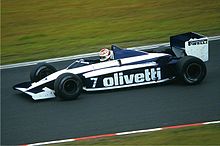Paul Rosche
Paul Rosche (* 1. April 1934 in Munich , † 15. November 2016 ibid ) was a German engineer who u. a. was responsible for BMW's Formula 1 turbo engine project in the 1980s. The nickname "Nocken-Paule" arose because of a weakness for exact camshaft calculations.
Life
After graduating from the Polytechnic on November 1, 1957, Rosche found a job at BMW at the request of his mother. He initially worked there for a few years under Alexander von Falkenhausen in the research and development department . At that time, only six people worked in this department, who were responsible for all components (block, piston, timing chain, oil pump, camshaft or valve springs) because BMW lacked the appropriately trained people. Alexander von Falkenhausen quickly discovered what talent Paul Rosche had. In the BMW engine design department, Paul Rosche became responsible for camshaft design overnight, although at first he had absolutely no idea about it.
The first engines that Paul Rosche employed were the V8 engines of the series 502 / 507 . Together with von Falkenhausen, Rosche played a key role in the development of the 4-cylinder engine for the “Mittelwagen” with an initially 1.5 liter cubic capacity (type “115”, later called BMW M10 ). This engine was first used from 1961 in the “New Class”, the BMW 1500 with 80 hp, and a short time later as the “118” (with two double Solex carburetors) in the BMW 1800 TI / SA with an output of 130 hp . The engine was then used from the BMW 02 to the BMW E30 and was the basis for all BMW racing engines in the following years. It was a milestone in a BMW success story in motorsport that continues to this day.
In the mid-1960s, when BMW began to get seriously involved in racing, Rosche switched to the motorsport department.
When BMW temporarily withdrew from racing in 1970 after the death of Gerhard Mitter and commissioned Alpina to look after its own interests, Rosche was part of an unofficial development team under von Falkenhausen that continued to work on racing engines until BMW decided to return in 1972.
From 1973 BMW cooperated with March in Formula 2 and Rosches Motoren won several European championships in the following years. The engines were also used in the BMW touring cars. When von Falkenhausen retired in 1975, Rosche took over the management of what was then BMW Motorsport GmbH .
Together with Jochen Neerpasch , he tried to convince the BMW board of directors to enter Formula 1. However, the project failed and Neerpasch left BMW. He was replaced by Dieter Stappert , and in 1980 BMW approved the Formula 1 project. At this point in time, Rosche had already pushed the development forward and the BMW M12 / 13 * engine was put to the test for the first time at the end of 1980; In 1982 he had his first race. The first victory followed in June of the same year with Nelson Piquet in Brabham at the Canadian Grand Prix . The engine achieved eight more victories and won the world championship in 1983 . In the years that followed, the BMW turbo in its maximum expansion stage with up to 1400 hp became the most powerful engine in Formula 1 history. At the end of 1986, BMW withdrew from Formula 1 and sold the engines to Megatron .
In the following years Rosche developed the engine for the M3 touring car , which won more races than any other car in this class. In the 1990s he built the BMW M70, an engine that was used, among other things, in the McLaren F1 , which in turn was designed by Gordon Murray . The 6.1-liter engine won the Le Mans 24 Hours in 1995 and repeated this success in 1999 in the BMW V12 LMR . The V10 engine with which Williams competed in Formula 1 from 2000 came largely from the pen of Rosche, who retired in 1999 at the age of 65.
Roshe was married and had a daughter.
Individual evidence
- ↑ Guntram Jordan: People: Paul Rosche - Der Meistermacher . In: Oldtimer Market . No. 1 , January 2006, ISSN 0939-9704 , p. 18-21 .
literature
- Karl H. Hufstadt: BMW Portraits. Paul Rosche: A brilliant engine designer. Stories about history . Egmont VGS, Cologne 2003, ISBN 3-8025-1520-X .
Web links
- Paul Rosche ( Memento from May 14, 2009 in the Internet Archive ) at http://bmw-motorsport.com /
- Paul Rosche. In: BMW history. BMW AG, accessed on November 16, 2016 (dossier on Paul Rosche in the BMW Group Archive).
| personal data | |
|---|---|
| SURNAME | Roshe, Paul |
| ALTERNATIVE NAMES | Cam paule |
| BRIEF DESCRIPTION | German engineer |
| DATE OF BIRTH | April 1, 1934 |
| PLACE OF BIRTH | Munich |
| DATE OF DEATH | 15th November 2016 |
| Place of death | Munich |
